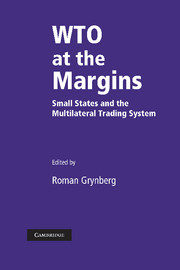Book contents
- Frontmatter
- Contents
- List of figures and appendices
- List of tables
- List of contributors
- Introduction
- Part I Theory and evidence
- 1 A theory of trade and development of small vulnerable states
- 2 Small countries: a survey of the literature
- 3 When comparative advantage doesn't matter: business costs in small economies
- 4 Can small states compete in manufacturing?
- 5 The economics of isolation and distance
- 6 The trade performance of small states
- 7 Small economies and special and differential treatment: strengthening the evidence, countering the fallacies
- Part II WTO and small economies
- Part III WTO dispute settlement
- Part IV Negotiating issues and institutional arrangements
- Index
1 - A theory of trade and development of small vulnerable states
Published online by Cambridge University Press: 05 May 2010
- Frontmatter
- Contents
- List of figures and appendices
- List of tables
- List of contributors
- Introduction
- Part I Theory and evidence
- 1 A theory of trade and development of small vulnerable states
- 2 Small countries: a survey of the literature
- 3 When comparative advantage doesn't matter: business costs in small economies
- 4 Can small states compete in manufacturing?
- 5 The economics of isolation and distance
- 6 The trade performance of small states
- 7 Small economies and special and differential treatment: strengthening the evidence, countering the fallacies
- Part II WTO and small economies
- Part III WTO dispute settlement
- Part IV Negotiating issues and institutional arrangements
- Index
Summary
Introduction: the theory of comparative advantage ad extremum
The purpose of this chapter is to attempt to draw together the common thread of the historical experience of trade and development of the small island states of the central and western Pacific within the context of economic theory. The theory of comparative advantage has, since Ricardo, been enunciated as a positive statement that nations will trade in those areas where they have a comparative advantage even if they have an absolute disadvantage in all areas. If a theory is to be general in nature, it must apply to all cases. There is perhaps nowhere better to challenge any theory than considering its applicability ad extremum. Indeed the smallest, most disadvantaged and remote of the micro-states of the central and western Pacific, e.g. Tuvalu, Kiribati and Niue, constitute a fascinating test of Ricardian trade theory for they provide examples of states which do not consistently trade in either goods or services, and maintain existing consumption levels from migration, remittances and aid. In such extreme cases, it is difficult to see how Ricardian theory of comparative advantage applies as an explanation of observed behaviour. Those who are wedded to Ricardian theory of trade as a ‘tautology of impregnable circularity’ would explain the observations from the remote islands of the South Pacific as merely a case of high transaction cost stemming from transport and the absence of economies of scale.
- Type
- Chapter
- Information
- WTO at the MarginsSmall States and the Multilateral Trading System, pp. 11 - 28Publisher: Cambridge University PressPrint publication year: 2006
- 3
- Cited by



